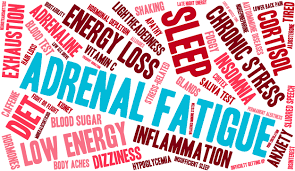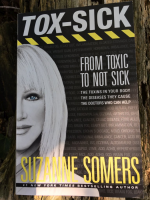
Three years ago, my energy levels were at an all time low. My days were hectic. I'd wake up every morning feeling as though I'd barely slept, reluctantly lace up my Nikes and complete an intense workout. My day would then be spent rushing between meetings, constantly adding more to my action points list. I'd only stop working at 10pm most nights. When I finally got into bed I'd lay there for hours, tired and wired.
I was exhausted. Instead of leaving me invigorated and ready to face the day ahead, exercise would leave me totally depleted of energy. I would get into work after a crossfit workout and slump into my office chair, only starting to feel like I had any energy at midday.
What was worse was that despite daily exercise and eating a low calorie, low carb diet, I was actually putting on weight! My periods were virtually non-existent and my acne was getting worse.
Does my situation sound familiar to you? That's what it feels like to have stress-based, adrenal PCOS.
In my article, "What's Causing Your PCOS and Why You Need to Know" I wrote about a patient called 'Megan'.
Megan has never been super lean, but was always normal weight and never had any period issues. She's a city lawyer and got into crossfit to 'lean-up' before her wedding 3 years ago. It worked like a charm initially and she was really happy with the results. But over the last 18 months she's started to put weight on, and no matter how many sessions she does, it won't budge. Being on the pill, she didn't notice any change to her periods until she came off that a year ago to get pregnant. After trying for a year, 2 weeks ago she made a visit to her gynecologist, who diagnosed her with PCOS.
I see so many patients who, like myself, have PCOS and are trying to manage their weight through diet and exercise, as well as hold down a stressful job and have a social life. But by doing this, they are actually making their PCOS worse. Extreme diet and exercise, combined with the stress of work and everyday life, can exacerbate insulin resistance PCOS or lead to women developing adrenal PCOS.
Stress Isn't Just Psychological
When we hear the word 'stress' we immediately think of that feeling of being stuck in traffic when you're already running late, looming deadlines for work you don't have time to complete, or receiving those expected bills when money is already tight.
This is psychological stress, but it's only one form of stress in your body.
In the medical world, the term 'stress' means anything that exceeds the adaptive capability of your body and raises your level of cortisol, the stress hormone. This means that you could be lying on a beach in the Bahamas, sipping a pina colada, with money in the bank, yet still have high levels of cortisol.
The common, non-psychological stressors that raise cortisol include:
- Chronic Infections
- Inadequate sleep
- Inflammation
- Autoimmune disease
- Environmental toxins
- Dieting
- Too much exercise
- Too much caffeine (or any, if you're sensitive to it)
If you're anything like me then you'll probably have a combination of many of these, and the more you have, the worse you'll feel. You might not feel physically stressed, but if you've got any of the underlying issues that I've mentioned above then they'll be having the same impact on your stress hormones and potentially causing adrenal PCOS.
Long Term Stress Causes Weight Gain
When our ancestors wandered the Sahara, the only forms of stress were from an animal or another tribe, and our fight or flight response was necessary for us to stay alive. Unfortunately, our bodies haven't evolved quickly enough to understand our modern psychological stress and so it's response is still to ready us for an attack.
Consequently, when cortisol is raised our body responds by releasing glucose into the bloodstream for our muscles to use. But instead of running or fighting like our ancestors did, we're sitting all day instead. The body doesn't like to have excess glucose in the blood, so it raises the amount of glucose-storing hormone, insulin, to store the glucose for later use. However, if you have insulin resistance then this process doesn't work. Instead, the excess glucose ends up being stored as fat.
Long Term Stress Leads to Adrenal PCOS
Cortisol is often referred to as the stress hormone. It's released from the adrenal glands as part of the body's fight-or-flight mechanism. This evolutionary mechanism is activated in response to fear or stress and involves several bodily processes which aim to increase our chance of survival. These include increasing blood sugar (to provide extra energy for running away from an impending attack) and suppressing unnecessary functions. This includes suppressing the immune system, bone formation, and reproductive function. In a life or death situation, the body wants to put all of its effort into immediate life-preserving activities. The health of our bones or ability to conceive is not something that is prioritised.
In response to stress, the adrenal glands are stimulated to produce cortisol, adrenaline, and noradrenaline, as well as adrenal androgen hormones, including DHEA, DHEA-S, and androstenedione. As you probably already know, elevated androgen levels is one of the primary diagnostic criteria for PCOS. In fact DHEA-S is responsible for up to 30% of PCOS, but unfortunately most doctors don't realise this and therefore never test for it.
Adrenal PCOS occurs when androgens released during the stress
response are converted to testosterone without any involvement with insulin and independent from the ovaries. As a result, you could have no insulin resistance and normally functioning ovaries, but still present with the symptoms of PCOS.
What's worse is that when stress is long-term, or chronic, the body releases even more androgens. This then leads to our weight, skin, and energy levels being more affected, causing yet more stress. You might be trying everything you can to address these issues, but getting nowhere fast. But if chronic stress is causing adrenal PCOS, then getting your stress under control could help you to see huge improvements.
Three Things You Can Do Today to Reverse Your Adrenal PCOS
1. Get More Sleep
Research shows that one third of people in the US consistently get less than eight hours of sleep per night and lack of sleep can lead to many problems. For example, getting less than five hours sleep per night reduces your insulin sensitivity by 25%.
But it doesn't end there. Lack of sleep also makes you hungrier, makes your blood sugar crash, and makes you gain weight. A study found that people who got less that five hours of sleep a night gained an average of two pounds per week because they were more likely to snack and reach for high calories foods. If that's what one week is doing, imagine a month, or what those all nighters are doing to you.
Reducing your stress at work may be difficult, but the amount of sleep you get each night should be something that you have more control over. However, if you have a disrupted cortisol rhythm then this can be easier said than done. You're feeling extremely fatigued, but when you lie down your brain is suddenly going a million miles an hour:
Long term stress not only raises cortisol, but also affects its rhythm. Cortisol levels should be high in the morning to prompt us to jump out of bed and start the day, then lower in the evening to allow us to sleep. But long term stress flips this rhythm on it's head, so that even after eight hours of sleep you're tired and brain foggy in the morning, then tired, but still wired, at night. This disruption is the big bad wolf.
That's why I've created a free download for you. My "7 Steps To Sleeping Like An Absolute Boss" contains my tried and tested ways to take control of your sleeping and reverse your PCOS.
2. Reduce your Endurance Exercise
Like me, you probably really love exercise and that feeling of accomplishment when you finish a great workout. Or perhaps you feel like your weight is out of control and that exercise is one thing you can do to help manage it.
But if you have chronically high stress hormones, then high intensity endurance exercise isn't going to be helping you and may actually be making you gain weight.
Research has shown that medium to high intensity exercise for more than 40 minutes, like running or a spin class, is actually a really ineffective form of weight loss. A review of 43 studies of endurance exercise and weight loss found that the average amount of weight lost for people exercising for 45 minutes, 3-5 times a week was just 1kg.
One of the reasons for this is because cortisol is elevated for many hours after endurance exercise. If you cortisol is high, or disrupted, don't just stop exercising. Instead, reduce your workouts to three 15-30 minute high intensity, strength-based sessions per week. Also try to do as much incidental activity (i.e. walking and standing) as possible.
3. Stop Dieting and Eat More Carbs (if you don't have insulin resistance)
It's estimated that 50-60% of Americans are dieting at any given time. For people, like you, that I see in my clinic everyday, it's more like 80-90%.
Not worrying about the number of calories you're consuming may go against everything you've ever been told (and everything that I was ever told at nutrition school, by the way), but it makes sense when you understand how it affects our cortisol levels and therefore our weight.
An incredibly interesting study proved that consciously cutting calories and consuming a low calorie diet both significantly increased cortisol levels. Additionally, for some people cutting carbs too much can also increase cortisol levels. A low carbohydrate diet can be effective for someone with insulin resistance, but if you don't have it then it could be making your hormones much worse, especially if you're also doing a lot of exercise.
I've written an article about how to determine your ideal carb intake. Follow the guidelines here.
I've picked the three techniques detailed above as examples because I have been, hands down, the worst offender of all three. Imagine what was happening to my body when I was working a massive amount of hours, dieting, and running at least 10km in the morning. I was a mere shell of a human.
I believe that the one thing that will make the most impact towards beating adrenal PCOS is getting more sleep. However, I know that it's often not just a matter of lying down and drifting off effortlessly. When you're tired, but wired, sleep can be very elusive. But that's why I've created a free download for you, my "7 Steps To Sleeping Like An Absolute Boss". These are my tried and tested ways to help you take control of your sleeping and reverse your adrenal PCOS.
Watch Video




